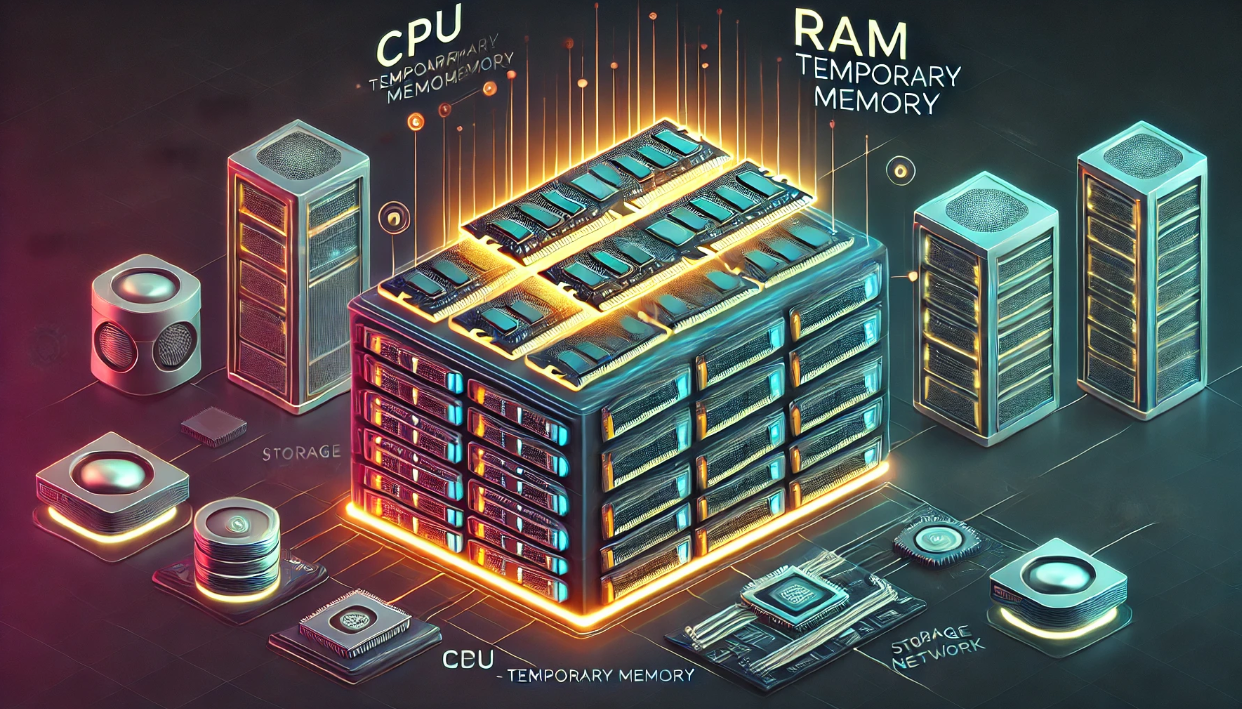Understanding RAM, CPU, and Bandwidth in VPS Hosting: Choosing the Right Plan
Meta Description: Confused about RAM, CPU, and bandwidth in VPS hosting? This guide breaks down each component in plain English to help you choose the best VPS plan for your website or business.
Introduction: VPS Hosting Specs, Explained Simply
When you’re shopping for VPS hosting, you’re bombarded with specs like RAM, CPU cores, and bandwidth. But what do these actually mean? And how do they impact your site’s performance?
Choosing the right VPS plan isn’t about picking the most expensive one — it’s about understanding what your site needs and matching it to the right resources.
This guide explains RAM, CPU, and bandwidth in plain, practical terms, so you can make a confident and informed decision.
What Is RAM in VPS Hosting?
RAM = Short-Term Memory for Your Server
Just like your computer, a VPS uses RAM (Random Access Memory) to temporarily store data that’s actively being used.
Why It Matters:
-
RAM affects how many simultaneous processes your server can handle
-
More RAM = smoother performance under heavy load
-
Low RAM = slowness, crashes, and errors when traffic spikes
Good for:
-
WordPress or CMS websites
-
Web apps with background tasks
-
E-commerce sites
RAM Guidelines:
| Type of Site | Recommended RAM |
|---|---|
| Basic Blog | 1 GB |
| WordPress + Plugins | 2–4 GB |
| eCommerce Site | 4–8 GB |
| SaaS/Web App | 8 GB+ |
Pro Tip: More RAM = better caching = faster page loads!
⚙️ What Is CPU (vCPU) in VPS Hosting?
CPU = The Brains Behind Your Server
The CPU (Central Processing Unit) processes all your server’s instructions — from loading a page to handling API requests.
In VPS hosting, you’ll often see vCPU (virtual CPU) listed, which refers to slices of a physical server’s processor allocated to your VPS.
Why It Matters:
-
CPU impacts how fast your site responds
-
More vCPUs = more concurrent tasks without slowing down
-
Crucial for websites with:
-
Heavy scripts
-
Dynamic content
-
Background processes (e.g., cron jobs)
-
CPU Guidelines:
| Type of Site | Recommended vCPUs |
|---|---|
| Basic Blog | 1 vCPU |
| Business Site | 2 vCPUs |
| Web App or Store | 2–4 vCPUs |
| High Traffic Platform | 4+ vCPUs |
Pro Tip: If your server is lagging even with enough RAM, CPU is the next upgrade to consider.
What Is Bandwidth in VPS Hosting?
Bandwidth = Monthly Data Transfer Limit
Bandwidth refers to the amount of data your server can transfer to visitors in a month. This includes:
-
Website content
-
Images, videos, downloads
-
Emails, backups, and database traffic
Why It Matters:
-
If you exceed bandwidth, your site may slow down, incur fees, or go offline
-
More bandwidth = handles more visitors + media-rich content
Bandwidth Guidelines:
| Usage | Monthly Bandwidth |
|---|---|
| Small Blog | 500 GB |
| Local Business Website | 1 TB |
| eCommerce Store | 2–3 TB |
| Media Site / Downloads | 3 TB+ or unmetered |
Pro Tip: Bandwidth ≠ speed. It’s like your monthly data cap, not how fast the data loads.
Quick VPS Hosting Spec Comparison Table
| Component | What It Does | When to Upgrade |
|---|---|---|
| RAM | Stores active tasks/data | You see slowness, 502/504 errors |
| CPU | Executes tasks | Site lags under traffic or scripts |
| Bandwidth | Transfers data to/from server | Monthly limit is being exceeded |
How to Choose the Right VPS Plan (In 3 Steps)
1. Assess Your Website’s Role
-
Blog, eCommerce, SaaS, client projects?
-
Dynamic vs static content?
-
High or low traffic?
2. Start Modestly, Scale Easily
Most VPS hosts let you scale up easily. It’s smarter to:
-
Start with a lean setup
-
Monitor performance and upgrade if needed
3. Monitor Resource Usage
Use your VPS dashboard or tools like:
-
Netdata
-
htop
-
VPS provider analytics
This helps prevent overpaying for unused power or under-provisioning.
Final Thoughts: VPS Specs Aren’t Just Numbers
RAM, CPU, and bandwidth aren’t just specs — they’re performance levers.
-
RAM keeps your site running smoothly.
-
CPU ensures fast page loads and processing.
-
Bandwidth ensures users can access your site anytime, from anywhere.
Choosing the right VPS plan means understanding these components and matching them to your site’s needs — so your site doesn’t just run… it thrives.

